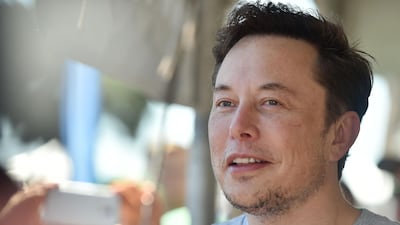Elon Musk's week ended better than it started.
A SpaceX rocket with an unmanned crew capsule successfully blasted off on Saturday for the International Space Station, in a historic milestone for Mr Musk's space company.
SpaceX's 4.9 metre Crew Dragon capsule, atop a Falcon 9 rocket, lifted off from Florida's Kennedy Space Center at 2.49am EST, carrying a test dummy nicknamed Ripley.
The capsule successfully separated from the rocket about 11 minutes later, sparking cheers in the control room, and began its journey to the space station.
"I'm a little emotionally exhausted because that was super stressful, but it worked," he told reporters after Saturday's launch, Reuters reported.
Amid the triumph for SpaceX, Mr Musk is confronting issues at Tesla.
His tweets have gotten him in more trouble with the US Securities and Exchange Commission; his unveiling of a cheaper $35,000 Tesla Model 3 comes amid plans of closing retail stores and eliminating jobs at the car maker; and his announcement that Tesla no longer expects to turn a profit in the first quarter resulted in shares plunging by as much as 7.8 per cent.
To top it off, a fatal crash in Florida on Friday involving a Tesla car and a semi-trailer is being investigated by the United States' National Highway Traffic Safety Administration (NHTSA) and the National Transportation Safety Board (NTSB).
It started last Monday when the US Securities and Exchange Commission seized on tweets the Tesla chief executive sent six days earlier. The SEC said the tweets violate a settlement reached in September that prevented Mr Musk from communicating material information without the company’s approval.
The agency asked a federal judge to find Mr Musk in contempt of the agreement after he posted Tesla will make half a million electric vehicles this year. The SEC revealed the tweet Mr Musk sent a few hours later, which clarified he meant to say production will reach an annualised rate of 500,000 cars by the end of 2019, was crafted with the help of an in-house lawyer.
Mr Musk didn’t take the SEC’s scrutiny well, writing on Tuesday to his more than 25 million followers that “something is broken with SEC oversight".
Legal experts said the chief executive could be facing millions of dollars in additional fines, tighter restrictions on his use of social media and even possibly be barred from running the company.
On Wednesday, Mr Musk moved Tesla shares by sending a series of vague tweets hinting at news the company would announce the following day. Wild speculation ensued after he changed his name on Twitter to “Elon Tusk".
In a nod to SpaceX, he then made his profile photo an image of Mars and added an alien emoji. He sent out another strange missive: “ET phone home. No answer.”
On Thursday, Tesla briefly stopped taking orders for vehicles on its website, which redirected visitors to a page teasing the announcement Mr Musk tweeted about earlier.
The news finally landed: Tesla made a $35,000 Model 3 available and introduced lower-priced versions of the Model S and Model X. Mr Musk said the company can afford to do this because it’s cutting costs by moving to online-only ordering and culling an unspecified number of jobs.
The chief executive told reporters on a conference call that Tesla probably won’t earn a profit in the first quarter, citing one-time charges and challenges of shipping cars to China and Europe. He predicted the company will go back to earning money in the second quarter.
Mr Musk gave yet another forecast for how many vehicles Tesla will produce this year, predicting somewhere in the range of 420,000 and 600,000.
Meanwhile, a filing in federal court in Manhattan revealed Mr Musk is bringing in a new legal team to defend himself against the SEC. He’s turned to former Enron prosecutor John Hueston and three other lawyers from Hueston Hennigan to take over from Williams & Connolly. The latter firm employs Dane Butswinkas, who relinquished the role of Tesla general counsel last week after just two months.
While the overall sense on Wall Street was that Thursday’s big reveal had something for both Tesla bulls and bears, the market pretty much hated it. On Friday, shares dropped 7.8 per cent, their biggest drop in 6 weeks.
The decision to shift to an online-only sales strategy struck some as a sign that the company was unable to squeeze out further savings from its Model 3 production process, while others took it as a signal for strong demand. Analysts also voiced concerns about the impact that the $35,000 Model 3 will have on Tesla’s profitability.
The company also paid off its $920 million convertible bond obligation in cash.
While Saturday's SpaceX test mission is a crucial step in the oft-delayed project, there are questions about whether Nasa can achieve its 2019 flight goal of manned flight. But if all goes well for the Crew Dragon for the remainder of its mission, the spacecraft could begin ferrying American astronauts to the orbiting lab as early as this summer.
SpaceX said the spacesuit for Ripley, the test dummy, has been embedded with sensors around its head, neck and spine to monitor how a flight would feel for a human.

